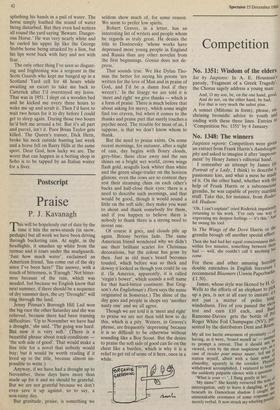Postscript
Praise
P. J. Kavanagh
This will be hopelessly out of date by the 1 time it hits the news-stands (in snow, perhaps) but all week we have been driving through bucketing rain. At night, in the headlights, it smashes up white from the tarmac and it roars under the mudguards. 'Just how much water', exclaimed an American friend, 'has come out of the sky since I've been here!' The answer, with a touch of bitterness, is 'Enough.' Not bitter- ness because of the rain, which was needed, but because we English know that next summer, if there should be a sequence of dry summer days, the cry 'Drought!' will ring through the land.
Jenny Pitman's Borough Hill Lad won the big race the other Saturday and she was relieved, because there had been training difficulties: `Up to November we have had a drought,' she said. 'The going was hard. But now it is very soft.' (There is a beautiful phrase about track-conditions — 'the soft side of good'. That would make a fine title for a novel that nobody would buy; but it would be worth reading if it lived up to the title, because almost im- possible to write.) Anyway, if we have had a drought up to November, these days have more than made up for it and we should be grateful. But we are not grateful because we don't even save it up against, so to say, a non-rainy day.
But gratitude, praise, is something we seldom show much of, for some reason. We seem to prefer low spirits.
Robert Graves, in a letter, has an interesting list of writers and people whom he regards as truly great. He denies the title to Dostoevsky 'whose works have depressed more young people in England and Russia than any other novelist from the first beginnings. Genius does not de- press.'
That sounds true. We like Dylan Tho- mas the better for saying his poems 'are written for the love of Man and in praise of God, and I'd be a damn fool if they weren't.' In the liturgy we are told it is 'meet and right' we give thanks — which is a form of praise. There is much before that about asking for mercy, which some might find too craven, but when it comes to the thanks and praise part that surely touches a psychic need. The trouble for most of us, I suppose, is that we don't know whom to thank.
But the need to praise exists. On some recent mornings, for instance, after a night of rain, day begins with floury clouds, grey-blue; these clear away and the sun shines on a bright wet world, crows wings flash gold, seagulls look whiter than white and the green silage-trailer on the horizon glistens: even the cows are so content they rest their steaming chins on each other's backs and half-close their eyes: there is a need to describe such mornings, and that would be good, though it would sound a little on the soft side; they make you want to shout and thank somebody for them, and if you happen to believe there is nobody to thank there is a strong need to invent one.
Of course it goes, and clouds pile up again. Briony berries fade. The same American friend wondered why we didn't use their brilliant scarlet for Christmas decorations, but the colour has gone by then. Just as old man's beard becomes tousled, which before was so thick and downy it looked as though you could lie on it. (In America, apparently, it is called 'virgin's bower', which sounds a soft name for that hard-bitten continent. But Grig- son's An Englishman's Flora says the name originated in Somerset.) The shine of the day goes and people in shops say 'another nasty one' and we all agree.
Though we are told it is 'meet and right' to praise we are not then told how to do this, which is a pity. Writers, in Graves's phrase, are frequently 'depressing' because it is so difficult to be otherwise without sounding like a Boy Scout. But the desire to praise the soft side of good can lie on the chest like a burden, which is why it is a relief to get rid of some of it here, once in a while.


















































 Previous page
Previous page